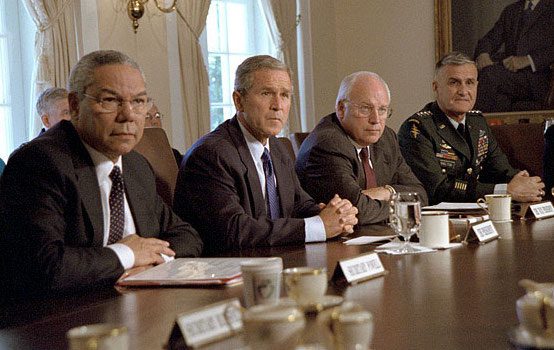The Moral Conceit of Our Post-9/11 Politics

The events of September 11, 2001 changed the United States and its politics forever. Initially, there was a huge outpouring of sympathy and solidarity, both domestic and international, for the victims and their families, and then a renewed groundswell of national unity and patriotic fervor. With it came an overwhelming sense that the U.S. must devote whatever resources it took to bring those responsible to justice.
In the foreign policy realm, this would all eventually give way to paranoia, compromises of values, and overreactions that drastically changed how America projected itself in global affairs. What was once simply a fatal conceit that the United States could shape the world to its benefit mutated into a moral conceit that privileged counterterrorism measures above all else. This moral conceit is now the driver of an incredibly destructive and counterproductive foreign policy agenda.
In the second half of the 20th century, with the advent of nuclear arms and modern military power, the world got significantly smaller. According to the foreign policy establishment, physical geography and distance, which had long been major factors in a nation’s strategic security, were rendered much less effective assets. For example, the natural barriers of the Atlantic and Pacific Oceans are less useful as buffer zones for the United States when another country has the ability to deliver nuclear missiles to any location on earth. Add in modern navies and other advanced weaponry, the argument went, and the world becomes even smaller.
Under this thinking, major powers are able to extend their spheres of influence and dominate regions far beyond their borders, even more so than their predecessors during the age of empire and at a lower relative cost. During the Cold War, the U.S. and the Soviet Union battled it out for global primacy, trying to shape the world in their own images.
When the USSR collapsed in the early 1990s, the U.S. became the only superpower capable of extending itself globally. And of course, we jumped at the chance, seeing an opportunity to expand our sphere of influence and introduce various market-oriented economic reforms in the former Soviet bloc and elsewhere. This shift was often couched in the aspirational language of liberalism, human rights, and the like. But there was nothing liberal about it. The U.S. made a calculation that making the world a protectorate was broadly in its own interest.
This all changed on 9/11. Those horrible events brought to light a new kind of threat, one that the U.S. had by and large ignored. Non-state terrorists were now seen as the biggest security challenge of the new century. The world had become even smaller.
9/11 added a moral dimension to foreign policy. The horror we witnessed changed our security calculus. Saving American lives by preventing future attacks of this kind became the U.S. government’s raison d’être, no matter the cost. Foreign policy became a moral crusade to root out evil anywhere on the planet, and “the American homeland is the planet,” according to the 9/11 commission report. Terror anywhere was considered terror here.
This crusade led us to the disastrous war in Iraq, as the Bush administration warned of mushroom clouds and lectured about Saddam Hussein’s ties to al-Qaeda. Regime change, they said, would make the world safer for democracy and prevent future terrorist attacks. In reality, it was all based on lies and it made the world less safe. It created a vacuum that upset the existing balance of power in the region, sparked a sectarian civil war, and provided inspiration to jihadists the world over.
It’s also why, after 17 years, we are still fighting a war in Afghanistan, despite having made little enduring progress during that time. The previous commander of U.S. forces in Afghanistan, General John Nicholson, made the case for continuing the war indefinitely by saying that the U.S. is there to save American lives. Despite there being little evidence that leaving Afghanistan would lead to another terror attack, the mere thought of it has justified endless occupation, which in turn feeds the cycle of violence that has ripped that country apart for decades.
Not just Afghanistan but all aspects of the war on terror have been driven by this moral conceit. Torture, indefinite detention, drone warfare, rendition, and surveillance are all necessary to prevent terrorism—the consequences be damned.
The moral conceit of post-9/11 politics has driven almost two decades worth of bad foreign policy. 9/11 was a terrible tragedy that deserves to be remembered. The immediate response was justified. But grief and fear can’t continue to drive our actions. Our overreaction has not made the world a better place.
Jerrod A. Laber is a DC-based writer and journalist, and a contributor to Young Voices. Follow him on Twitter @JerrodALaber.
Comments